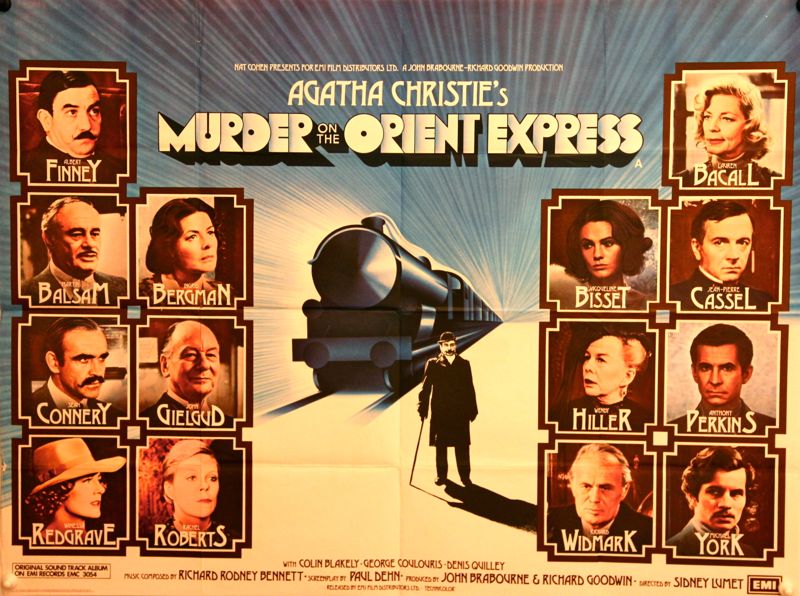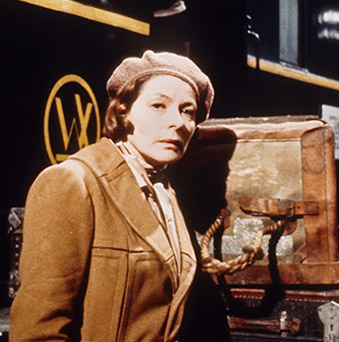We're near the end of Ingrid Bergman's career so here's the penultimate episode in our retrospective. Happy 100th to the superstar on August 29th. Here's Lynn Lee...

By 1974, Ingrid Bergman was a grande dame of film in the twilight of her career, with two Best Actress Oscar wins under her belt, and nothing left to prove. Perhaps that’s why she deliberately opted for such a small part in the star-studded Murder on the Orient Express, despite director Sidney Lumet’s attempts to coax her into taking a bigger one. And yet, despite her own efforts to stay out of the spotlight, it found her anyway, with her tiny role as a mousy, middle-aged Swedish missionary netting her an unlikely third Oscar.
 We don’t see too many movies like Orient Express these days – A-list extravaganzas where most of the stars end up with little more than glorified cameos but just seem to be in it for fun. And to be fair, the movie is fun and directed with flair, even as it plays up the absurd theatricality of the whodunit setup – something that doesn’t register as strongly when you’re reading Agatha Christie’s plummy prose. It’s a bit much at times...
We don’t see too many movies like Orient Express these days – A-list extravaganzas where most of the stars end up with little more than glorified cameos but just seem to be in it for fun. And to be fair, the movie is fun and directed with flair, even as it plays up the absurd theatricality of the whodunit setup – something that doesn’t register as strongly when you’re reading Agatha Christie’s plummy prose. It’s a bit much at times...
A ludicrously miscast Albert Finney hams it up so hard as supersleuth Hercule Poirot he verges on pure camp; Sean Connery throws a punch that plays like slapstick comedy; Wendy Hiller’s hauteur as an elderly Russian aristocrat, the role Lumet originally wanted Bergman to take, is exceeded only by the deathly whiteness of her makeup. (Anthony Perkins cast as another nervy bachelor with a mother fixation is also good for a laugh.)
Amid the scenery chomping, Bergman could almost slip by unnoticed except, of course, she’s la Bergman. She can’t be on screen for more than a total of ten minutes, but she does establish a distinct presence right from our first glimpse of her, tremulously approaching the train in the wake of the gimlet-eyed, confidently striding Lauren Bacall. As she pauses to search desperately for a lost St. Christopher’s medal even as local peddlers offering replacements swarm about her, the two dominating notes of her character emerge almost immediately: (1) she’s haunted by something, and (2) she’s fervently religious. Might the two be related? It doesn’t take a Poirot to figure that out.
Once on board, our fleeting glimpses of her mixing with the other passengers do nothing to dispel that first impression. When she finally gets her close-up – that is, her one-on-one with Poirot, who’s investigating the murder of a fellow passenger – she doubles down on it. Her name is Greta Ohlsson, and she is a missionary to “little brown babies” in Africa. Or maybe it’s India. In oddly stilted broken English, she explains that she was “born backwards” and not of religious parentage, but saw a vision of Jesus one day. But something seems to be troubling her still, as she breaks into tears on little provocation, obviously deeply distraught about something. She cheers up a little when Poirot tells her that he will contribute to her mission, and responds graciously, “God will find you a reward.”

And that’s it. Greta barely appears again in the film, except for one key moment that confirms her as the most morally conflicted and guilt-racked character on board the train (and no, that’s not the same as saying she’s the guiltiest).
Lumet said about Bergman’s role
Since her part was so small, I decided to film her one big scene, where she talks for almost five minutes, straight, all in one long take. A lot of actresses would have hesitated over that. She loved the idea and made the most of it. She ran the gamut of emotions. I’ve never seen anything like it.
While I wouldn’t go that far, there’s no denying she adds a layer of emotional depth that’s otherwise lacking in the movie. But was it enough for an Oscar nod? If you were going to nominate any of the supporting ladies from this Orient Express, Bacall and Hiller had much meatier roles, and executed them just as competently – though I maintain Bacall, in contrast to many of her co-stars, was not over-the-top enough for her character.
Bergman’s win is even more of a head-scratcher. She was easily the most famous nominee in her category, but she wasn’t exactly “due” for yet another Oscar. More people to this day remember Madeline Kahn’s turn in Blazing Saddles. Talia Shire's contribution to the The Godfather series has more resonance in film history. Ingrid herself clearly wanted Valentina Cortese to win! (What's more: Diane Ladd's "Flo" character in Alice Doesn't Live Here Anymore even continued on to more awards races after the Oscars when the TV series adaptation won Golden Globe nominations for Polly Holliday who took over the role.) Maybe the Academy felt inclined to give something to Murder on the Orient Express? (Thank the lord it wasn’t for Finney, who was also nominated, even more inexplicably, for Best Actor.) Whatever the reason, this award enters the annals of Oscar WTFs. Bergman, however, remains untainted by it. She was just trying to play a bit part in an ensemble, and happened to do it well enough to get more recognition than she deserved.